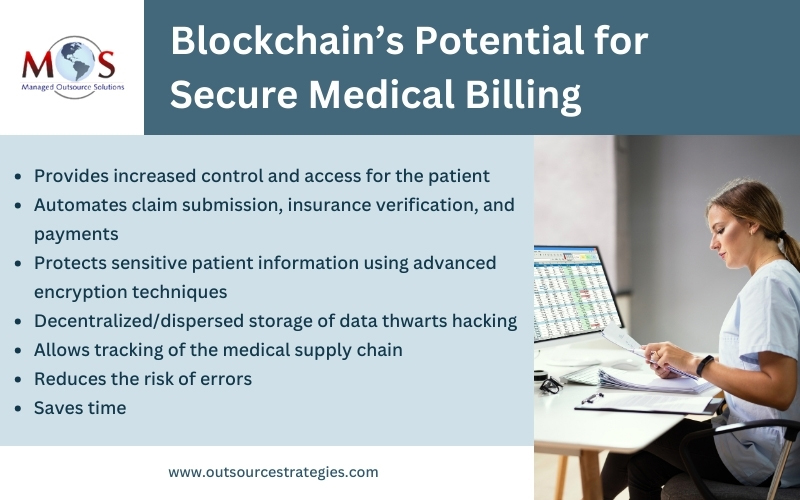The healthcare industry is subject to extensive regulations. US privacy and security laws such as HIPAA require healthcare organizations to protect personal information, imposing heavy penalties for data breaches. With stringent regulations dictating the storage and protection of this invaluable information in the cloud, healthcare organizations are increasingly turning to innovative solutions such as blockchain technology. Utilizing blockchain technology in healthcare billing can streamline the process and importantly, promote data security and transparency.

What is Blockchain?
IBM defines blockchain as “a shared, immutable ledger that facilitates the process of recording transactions and tracking assets in a business network.” It is decentralized, meaning no single entity controls the flow of information, and all network participants have access to the distributed ledger and the same immutable record of transactions.
With this shared ledger, transactions are recorded only once, eliminating duplicate processes. No participant can change a recorded transaction in the shared ledger. If there is an error in a transaction record, a new transaction must be added to correct the error. The blockchain stores a set of rules or a “smart contract” to carry out transactions automatically and complete them quickly.
All validated transactions in the blockchain are immutable because they are recorded permanently. No one, not even a system administrator, can delete a transaction. This means that patient information distributed across a network of computers remains encrypted and remarkably resistant to unauthorized access or modification.
These capabilities make blockchain the ideal technology for overseeing and tracking medical billing transactions, ensuring precision and preventing tampering of information.
Blockchain Technology and the Potential for Secure Billing
In healthcare, blockchain’s appeal lies in its potential to revolutionize data security and privacy. By leveraging blockchain, healthcare organizations aim to not only store sensitive patient data but also safeguard it. By offering a decentralized and immutable ledger, the technology allows for the creation of secure, transparent, and tamper-proof patient care and billing records.
Let’s explore how the security offered by blockchain technology makes it one of the most promising emerging trends in medical billing and coding.
Safeguards sensitive patient information
Blockchain integration in medical billing processes revolutionizes security, transparency, and efficiency. Its transparent ledger system enhances visibility and trust among physicians, patients and insurance companies. For example, if a healthcare provider inputs details about a patient’s diagnosis, treatment, and expenses into the blockchain, authorized entities like the patient and insurance company can access this information to verify its accuracy. This system ensures patient privacy by safeguarding data while allowing controlled access specifically to these important stakeholders. Blockchain can also assist a medical billing company by ensuring the security and privacy of sensitive patient data. Its encrypted and decentralized nature helps safeguard patient data, preventing unauthorized access and tampering, thereby maintaining confidentiality and security in medical billing processes.
Smart contracts increase trust
Blockchain technology in healthcare billing automates predefined rules and agreements. Smart contracts execute medical billing processes automatically when specific conditions are met. For instance, when a service is provided, the smart contract can trigger the billing process, generate invoices, verify insurance coverage, and execute payments-all without manual intervention. This automation reduces administrative workload, minimizes errors, and expedites payment cycles. Additionally, smart contracts boost transparency by providing a transparent and auditable trail of billing activities, ensuring accuracy and trust between involved parties in the billing process.
Supply chain transparency
In Blockchain’s distributed digital ledger, every step in the medical supply chain, like when a product is made, who buys it, and when it’s delivered, is recorded in blocks. These blocks are linked together, creating a chain of information that cannot be changed. So, any party involved in a transaction can easily trace a product’s journey from start to finish, ensuring transparency and authenticity in the supply chain.
Future Trends in Blockchain for Billing Security
Blockchain technology has gained attention in medical billing for its potential to enhance data security, transparency, and interoperability. However, this technology, although promising, is in its budding phase, presenting numerous challenges before widespread integration.
A primary obstacle is the absence of standardization and interoperability among varied blockchain platforms. This discrepancy poses a barrier to seamless communication and information exchange between entities like healthcare providers and insurers. Ensuring compliance with HIPAA and other healthcare regulations while utilizing blockchain can also be complex and requires careful navigation.
Securing blockchain and smart contract software poses greater complexity and challenges compared to almost any other technology. To ensure secure billing with blockchain, it’s imperative to tackle its security challenge. A TechTarget article advises weighing blockchain security vulnerabilities and recommends various strategies for secure adoption.
- Software needs to be regularly updated to address security vulnerabilities in blockchain and smart contract systems.
- Healthcare organizations must allocate resources for monitoring and updating these systems, making sure code auditors or tools effectively identify vulnerabilities.
- Safeguarding sensitive operations’ cryptographic material will require storing hardware security modules (HSM) with appropriate backups.
- Providers will need to have comprehensive business and technical processes in place to detect and prevent errors or malicious activities.
Collaboration between technology experts, healthcare providers, and regulatory bodies is crucial for successful and compliant blockchain integration in healthcare billing.
It’s important to note that regardless of the efficiencies of automated systems, the role of billing experts is extremely significant to accuracy of processes. Automated systems operate based on predefined algorithms and rules, which may not account for unique scenarios or exceptions. Billing experts have the expertise to handle these situations, applying their knowledge to find appropriate solutions and ensure accurate billing. For example, when a practice outsources health insurance verification to us, they can ensure that patients know their full responsibility prior to their appointment. Additionally, while EMR/EHR automate the claims, we still need to review them before they are sent out. The automated system might not detect modifiers that can be used to get the claim paid or unbundling of procedures, upcoding, or other fraudulent activities that require human expertise to identify.
Boost medical coding accuracy and efficiency!






